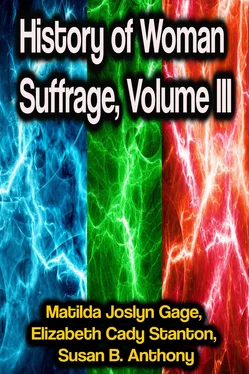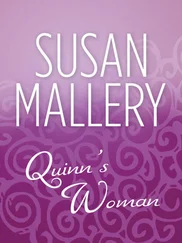Looking back over the past thirty years, how long ago seems that July morning when we gathered round the altar in the old Wesleyan church in Seneca Falls! It taxes and wearies the memory to think of all the conventions we have held, the legislatures we have besieged, the petitions and tracts we have circulated, the speeches, the calls, the resolutions we have penned, the never-ending debates we have kept up in public and private, and yet to each and all our theme is as fresh and absorbing as it was the day we started. Calm, benignant, subdued as we look on this platform, if any man should dare to rise in our presence and controvert a single position we have taken, there is not a woman here that would not in an instant, with flushed face and flashing eye, bristle all over with sharp, pointed arguments that would soon annihilate the most skilled logician, the most profound philosopher.
To those of you on this platform who for these thirty years have been the steadfast representatives of woman's cause, my friends and co-laborers, let me say our work has not been in vain. True, we have not yet secured the suffrage, but we have aroused public thought to the many disabilities of our sex, and our countrywomen to higher self-respect and worthier ambition, and in this struggle for justice we have deepened and broadened our own lives and extended the horizon of our vision. Ridiculed, persecuted, ostracised, we have learned to place a just estimate on popular opinion, and to feel a just confidence in ourselves. As the representatives of principles which it was necessary to explain and defend, we have been compelled to study constitutions and laws, and in thus seeking to redress the wrongs and vindicate the rights of the many, we have secured a higher development for ourselves. Nor is this all. The full fruition of these years of seed-sowing shall yet be realized, though it may not be by those who have led in the reform, for many of our number have already fallen asleep. Another decade and not one of us may be here, but we have smoothed the rough paths for those who come after us. The lives of multitudes will be gladdened by the sacrifices we have made, and the truths we have uttered can never die.
Standing near the gateway of the unknown land and looking back through the vista of the past, memory recalls many duties in life's varied relations we would had been better done. The past to all of us is filled with regrets. We can recall, perchance, social ambitions disappointed, fond hopes wrecked, ideals in wealth, power, position, unattained—much that would be considered success in life unrealized. But I think we should all agree that the time, the thought, the energy we have devoted to the freedom of our countrywomen, that the past, in so far as our lives have represented this great movement, brings us only unalloyed satisfaction. The rights already obtained, the full promise of the rising generation of women more than repay us for the hopes so long deferred, the rights yet denied, the humiliation of spirit we still suffer.
And for those of you who have been mere spectators of the long, hard battle we have fought, and are still fighting, I have a word. Whatever your attitude has been, whether as cold, indifferent observers—whether you have hurled at us the shafts of ridicule or of denunciation, we ask you now to lay aside your old educational prejudices and give this question your earnest consideration, substituting reason for ridicule, sympathy for sneers. I urge the young women especially to prepare themselves to take up the work so soon to fall from our hands. You have had opportunities for education such as we had not. You hold to-day the vantage-ground we have won by argument. Show now your gratitude to us by making the uttermost of yourselves, and by your earnest, exalted lives secure to those who come after you a higher outlook, a broader culture, a larger freedom than have yet been vouchsafed to woman in our own happy land.
Congratulatory letters[39] and telegrams were received from all portions of the United States and from the old world. Space admits the publication of but a few, yet all breathed the same hopeful spirit and confidence in future success. Abigail Bush, who presided over the first Rochester convention, said:
No one knows what I passed through upon that occasion. I was born and baptized in the old Scotch Presbyterian church. At that time its sacred teachings were, "if a woman would know anything let her ask her husband at home." * * * I well remember the incidents of that meeting and the thoughts awakened by it. * * * Say to your convention my full heart is with them in all their deliberations and counsels, and I trust great good to women will come of their efforts.
Ernestine L. Rose, a native of Poland, and, next to Frances Wright, the earliest advocate of woman's enfranchisement in America, wrote from England:
How I should like to be with you at the anniversary—it reminds me of the delightful convention we had at Rochester, long, long ago—and speak of the wonderful change that has taken place in regard to woman. Compare her present position in society with the one she occupied forty years ago, when I undertook to emancipate her from not only barbarous laws, but from what was even worse, a barbarous public opinion. No one can appreciate the wonderful change in the social and moral condition of woman, except by looking back and comparing the past with the present. * * * Say to the friends, Go on, go on, halt not and rest not. Remember that "eternal vigilance is the price of liberty" and of right. Much has been achieved; but the main, the vital thing, has yet to come. The suffrage is the magic key to the statute—the insignia of citizenship in a republic.
Caroline Ashurst Biggs, editor of the Englishwoman's Review , London, wrote:
I have read with great interest in the National Citizen and the Woman's Journal the announcement of the forthcoming convention in Rochester. * * * I cannot refrain from sending you a cordial English congratulation upon the great advance in the social and legal position of women in America, which has been the result of your labor. The next few years will see still greater progress. As soon as the suffrage is granted to women, a concession which will not be many years in coming either in England or America, every one of our questions will advance with double force, and meanwhile our efforts in that direction are simultaneously helping forward other social, legal, educational and moral reforms. Our organization in England does not date back so far as yours. There were only a few isolated thinkers when Mrs. John Stuart Mill wrote her essay on the enfranchisement of women in 1851. For twenty years, however, it has progressed with few drawbacks. In some particulars the English laws in respect of women are in advance of yours, but the connection between England and America is so close that a gain to one is a gain to the other.
Lydia E. Becker, editor of the Women's Suffrage Journal , Manchester, England, wrote:
* * * I beg to offer to the venerable pioneers of the movement, more especially to Lucretia Mott, a tribute of respectful admiration and gratitude for the services they have rendered in the cause of enfranchisement. * * * As regards the United kingdom, the movement in a practical form is but twelve years old, and in that period, although we have not obtained the parliamentary franchise, we have seen it supported by at least one-third of the House of Commons, and our claim admitted as one which must be dealt with in future measures of parliamentary reform. We have obtained the municipal franchise and the school-board franchise. Women have secured the right to enter the medical profession and to take degrees in the University of London, besides considerable amendment of the law regarding married women, though much remains to be done.
Читать дальше












